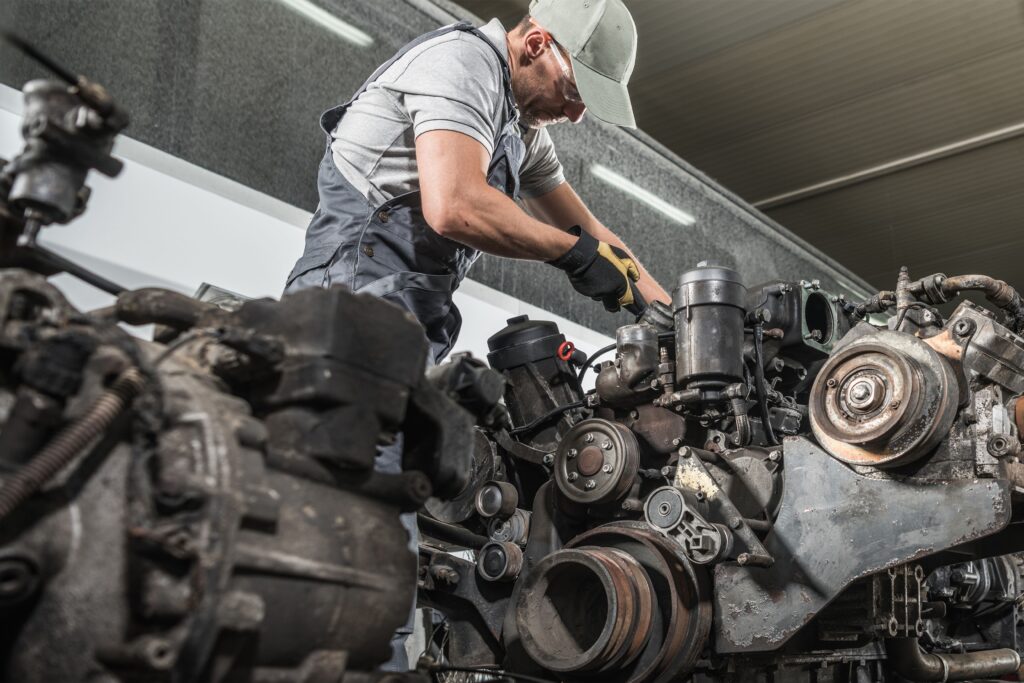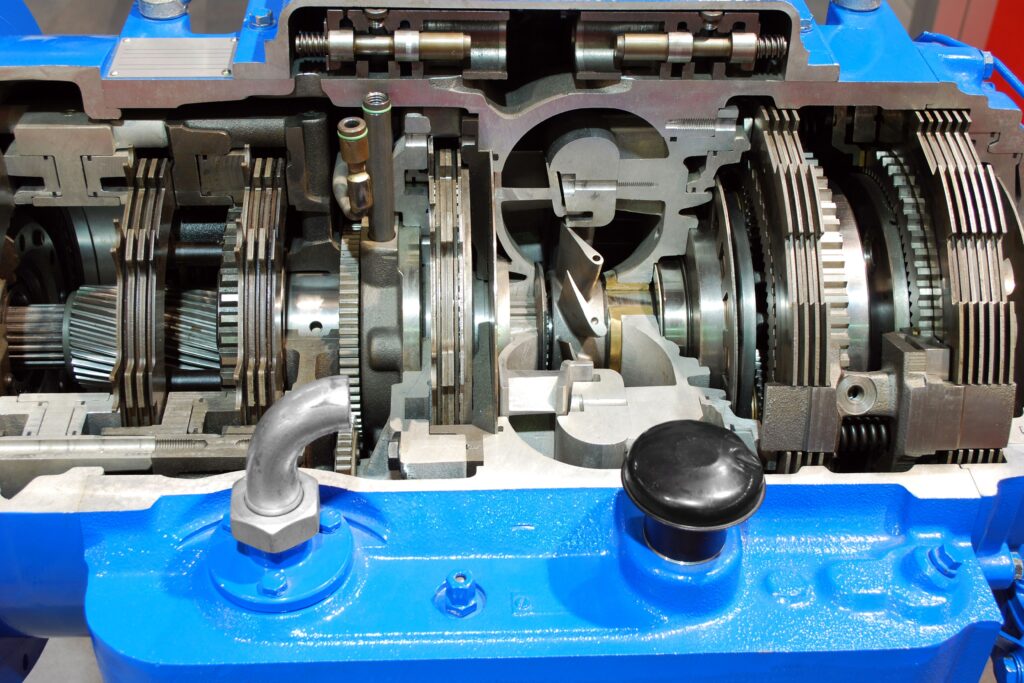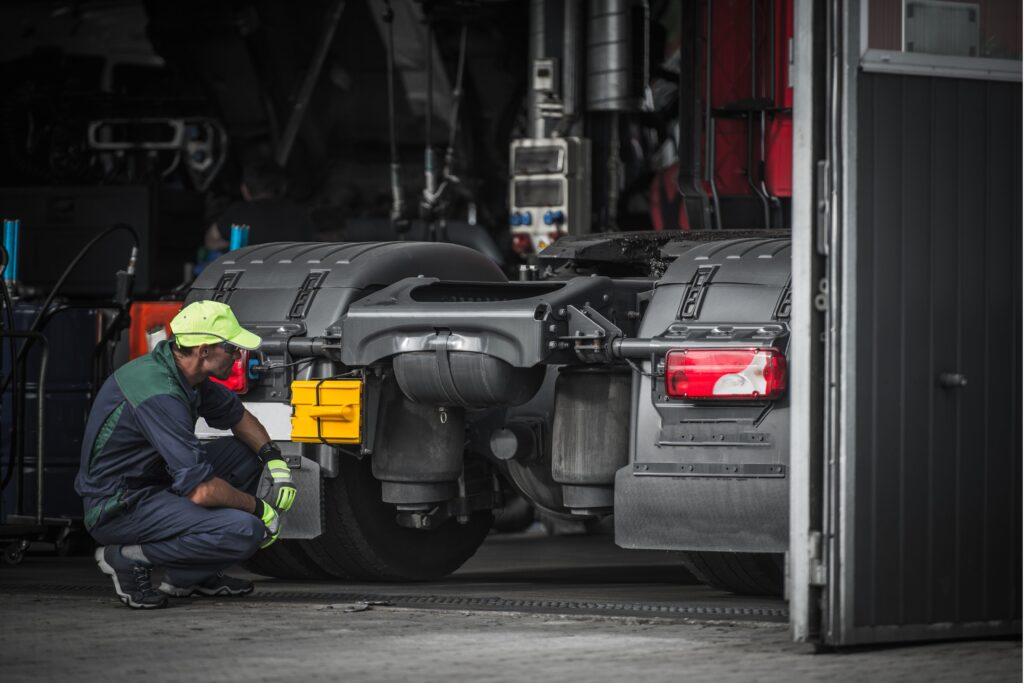The transportation industry plays a crucial role in the global economy, ensuring the smooth movement of goods and materials across vast distances. Within this industry, truck mechanics are unsung heroes who keep the wheels turning and ensure the safety and reliability of trucks on the road.

These highly skilled professionals are responsible for diagnosing, repairing, and maintaining trucks to ensure optimal performance and minimize downtime. Their expertise directly impacts operational efficiency, delivery timelines, and overall customer satisfaction.
Truck Mechanics in the Transportation Industry
In a world heavily reliant on goods being transported far and wide, truck mechanics serve as guardians of mobility. They possess a unique skill set that allows them to tackle complex mechanical issues that may arise during daily operations.
From troubleshooting engine problems to addressing electrical malfunctions or brake system failures, these professionals have an intricate understanding of the intricate machinery that powers these colossal vehicles. Moreover, truck mechanics play a vital role in ensuring road safety.
Regular maintenance, inspections, and repairs carried out by trained professionals contribute to reducing accidents caused by mechanical failures. By adhering to strict quality standards while servicing trucks, these experts help prevent potential hazards on highways and work towards preserving human lives.
Specialized Training and Certification

Given the critical nature of their work in maintaining safe and reliable transportation systems, truck mechanics must possess specialized training in their field.
Unlike general automotive repair technicians who handle various types of vehicles, these professionals focus specifically on trucks due to their unique characteristics such as size, weight capacity, engine type (often diesel), complex electrical systems, and air brake systems (commonly used in heavy-duty trucks), among others. Acquiring comprehensive knowledge about truck maintenance and repair techniques specific to this niche field requires formal training programs offered by vocational schools or community colleges.
These programs provide aspiring truck mechanics with the necessary theoretical foundation and hands-on experience to master the intricacies of truck maintenance and repair. Specialized training equips these professionals with practical skills that are directly applicable to their daily work, enabling them to address a wide range of mechanical issues effectively.
Overview of Training Programs
The demand for skilled truck mechanics in the transportation industry has led to the establishment of numerous training programs offered by vocational schools and community colleges. These programs aim to equip aspiring truck mechanics with the necessary knowledge and skills to excel in their profession. The comprehensive nature of these training programs ensures that graduates are well-prepared to tackle the wide array of maintenance and repair tasks they will encounter in their careers.
Vocational Schools and Community Colleges Offering Truck Mechanic Programs
Many reputable vocational schools and community colleges across the country offer specialized truck mechanic programs designed to meet the industry’s growing demand for skilled professionals. These programs provide a structured curriculum that covers various aspects of truck maintenance and repair, ensuring a well-rounded education. Students enrolled in these programs benefit from expert instructors who possess real-world experience as truck mechanics themselves.
They bring practical insights into the classroom, enhancing students’ understanding through real-life examples. Moreover, many institutions have partnerships with local businesses or even trucking companies, allowing students to gain valuable hands-on experience through internships or cooperative education opportunities.
Curriculum Covering Various Aspects of Truck Maintenance and Repair
The curriculum offered by vocational schools and community colleges offering truck mechanic programs is carefully crafted to impart both theoretical knowledge and practical skills. Students undergo comprehensive training on topics such as engine systems, electrical systems, brake systems, transmission systems, suspension systems, and HVAC (heating, ventilation, and air conditioning) systems specific to trucks.
The coursework is often delivered through lectures, demonstrations, workshops, and laboratory sessions. In-class instruction provides a solid foundation in fundamental principles while hands-on training allows students to apply what they’ve learned on actual trucks under supervision.
This approach fosters a deep understanding of concepts alongside the development of essential manual dexterity and problem-solving skills. Moreover, students may also learn about safety practices, regulatory compliance, and the use of diagnostic tools and equipment commonly employed in the industry.
The curriculum is regularly updated to keep up with technological advancements and industry standards, ensuring that aspiring truck mechanics are well-prepared to meet the ever-evolving demands of their profession. Vocational schools and community colleges offering truck mechanic programs provide a comprehensive education that equips students with the necessary skills to excel in their future careers.
The curriculum encompasses various aspects of truck maintenance and repair, ensuring graduates possess a broad knowledge base. The hands-on training opportunities offered as part of these programs allow students to develop practical skills in a supervised environment, preparing them for real-world challenges they will encounter as professional truck mechanics.
Certification Bodies for Truck Mechanics
National Institute for Automotive Service Excellence (ASE)
The National Institute for Automotive Service Excellence, widely known as ASE, is a prominent certification body that sets the standard for excellence in the automotive industry. With a specific focus on truck mechanics, ASE offers comprehensive certification programs tailored to ensure competence in various areas of expertise. One of the core features of ASE’s certification process is its rigorous testing system.
To attain an ASE certification as a truck mechanic, individuals must pass a series of exams that thoroughly evaluate their knowledge and practical skills. These tests are specifically designed to assess proficiency in specific areas such as engine systems, electrical systems, brake systems, transmission systems, suspension systems, and HVAC systems.
Industry experts develop the exams and undergo regular updates to align with technological advancements and industry best practices. ASE offers multiple levels of certification that demonstrate escalating levels of expertise.
The entry-level certification is referred to as the ASE Automobile & Light Truck Certification (A-series). As mechanics gain experience and expand their knowledge base, they can pursue more specialized certifications such as the Medium-Heavy Truck Certification (T-series).
Additionally, there is an option to achieve Master Technician status by earning multiple certifications across different areas of specialization. This prestigious designation acknowledges professionals with exceptional skills and knowledge within the field of truck mechanics.
By establishing a stringent testing process and offering various levels of certifications including Master Technician status, ASE ensures that certified truck mechanics possess up-to-date knowledge and demonstrate high levels of competency in their respective areas. These certifications not only inspire confidence among employers but also provide reassurance to customers who rely on knowledgeable professionals for their truck maintenance needs
Specialized Training Areas for Truck Mechanics

Engine Systems
Engines are the powerhouse of any vehicle, and for truck mechanics, understanding diesel engines is paramount. A comprehensive training program delves into the intricacies of these robust power units, exploring their components and functions. Trainees learn about the fundamental aspects that make diesel engines unique, such as fuel injection systems, turbochargers, and exhaust after-treatment systems.
Moreover, a significant part of specialized engine training focuses on troubleshooting common issues that may arise during a truck’s operation. Mechanics are taught to analyze symptoms like misfiring, excessive smoke emissions, or loss of power to pinpoint potential problems accurately.
Through hands-on experience with engine diagnostic tools and equipment, trainees gain expertise in performing repairs efficiently and effectively. From addressing faulty fuel injectors to replacing worn-out cylinder liners or timing belts, skilled mechanics emerge from these programs well-equipped to tackle engine-related challenges.

Electrical Systems
With technological advancements transforming modern trucks into sophisticated machines on wheels, truck mechanics must possess deep knowledge of complex electrical systems. Training programs familiarize students with intricate wiring diagrams and electrical circuitry found in different truck models. They explore topics such as battery management systems, alternators, starters and lighting systems.

Transmission Systems
Manual and Automatic Transmissions
In the world of truck mechanics, a thorough understanding of transmission systems is crucial. Truck mechanics must be well-versed in both manual and automatic transmissions, as these are the two primary types found in trucks. Manual transmissions require a deep understanding of gear ratios, synchronizers, clutch mechanisms, and shift linkages.
Mechanics need to have the knowledge and skills to diagnose issues such as slipping gears, grinding noises, or difficulty shifting. On the other hand, automatic transmissions are complex systems that rely on hydraulic pressure and intricate electronic controls.
Truck mechanics specializing in this area must possess a comprehensive understanding of valve bodies, torque converters, planetary gear sets, solenoids, and sensors. They need to be able to diagnose problems such as delayed or harsh shifting, transmission fluid leaks, or erratic behavior.
Diagnosing Transmission Issues
When it comes to diagnosing transmission issues in trucks, precision is key. Truck mechanics who specialize in transmission systems must have access to advanced diagnostic tools that can read fault codes specific to transmissions.
Using these tools alongside their expertise allows them to identify the root cause of any problems accurately. Once diagnosed, truck mechanics can perform necessary repairs on transmissions.
This includes replacing worn-out clutches or gears for manual transmissions or addressing faulty solenoids or damaged torque converters for automatic ones. They may also need to rebuild or replace entire transmission units if the damage is extensive.
Suspension Systems
Suspension Types
Trucks come with various suspension systems depending on their purpose and load-carrying capacity. Suspension systems play a critical role in providing stability and comfort while ensuring the safe handling of these massive vehicles.
Truck mechanics specializing in suspension systems must be familiar with different types, such as leaf spring suspensions commonly found in heavy-duty trucks or air suspensions used in commercial and semi-trucks. Understanding the intricacies of each suspension type is vital.
This includes knowledge of components like shock absorbers, control arms, bushings, and sway bars. Truck mechanics need to know how to inspect these components for wear and damage, and determine if adjustments or replacements are required for optimal performance.
Suspension Inspections, Adjustments, and Replacements
Truck mechanics specializing in suspension systems must have the expertise to perform thorough inspections. This involves evaluating the condition of individual components, identifying worn-out parts or leaks in air suspensions, measuring ride height, or determining axle alignment. Based on their assessment, they can recommend appropriate adjustments or replacements to restore optimal suspension performance.
Adjustments may involve tightening or loosening specific bolts for proper alignment or adjusting airbag pressure in an air suspension system. In cases where replacement is necessary due to worn-out components like bushings or damaged shock absorbers, truck mechanics must have the skills to disassemble and reassemble these complex systems accurately.
HVAC Systems
Knowledge of HVAC
Truck cabins provide drivers with a comfortable working environment regardless of external weather conditions. Truck mechanics specializing in HVAC (heating, ventilation, and air conditioning) systems require comprehensive knowledge of heating, ventilation, and air conditioning units specific to trucks. They need to understand how these systems operate and interact with other vehicle components.
Truck HVAC systems often include multiple zones with separate temperature controls for drivers and passengers’ comfort. Mechanics must be familiar with various heating mechanisms (e.g., coolant-based heaters) as well as ventilation fans and filters that ensure fresh airflow inside the cabin.
Additionally, they need expertise in truck-specific refrigeration units commonly found in refrigerated trucks used for transporting perishable goods.
Troubleshooting HVAC issues and performing repairs
Troubleshooting HVAC issues in trucks requires a combination of technical knowledge and diagnostic skills. Truck mechanics specializing in HVAC systems need to be able to identify problems such as inadequate heating or cooling, reduced airflow, or malfunctioning controls. Once identified, they can perform necessary repairs on the HVAC system.
This may involve replacing faulty components like compressors or valves, repairing refrigerant leaks, cleaning or replacing filters, or ensuring proper electrical connections. Mechanics must also have a strong understanding of environmental regulations related to refrigerant handling and disposal for compliance purposes.
Conclusion
Truck mechanics specializing in transmission systems play a crucial role in diagnosing and repairing complex gear-shifting mechanisms. In contrast, those with expertise in suspension systems ensure safe handling and comfort for drivers by inspecting, adjusting, and replacing suspension components as required. Additionally, mechanics well-versed in HVAC systems contribute to drivers’ comfort by troubleshooting issues and performing necessary repairs on heating, ventilation, and air conditioning units specific to trucks.
With their specialized training and knowledge across these areas, truck mechanics are the unsung heroes who keep the wheels of the transportation industry turning smoothly. By continually updating their skills through training programs and acquiring certifications from reputable bodies like ASE, truck mechanics ensure their competence in addressing technological advancements within these specialized areas.
Their dedication not only enhances their professional growth but also assures truck owners that their investments will be well-maintained by highly skilled professionals. Thus, the future of truck maintenance looks promising with these expert specialists leading the charge towards safer roads and more efficient transportation networks.










